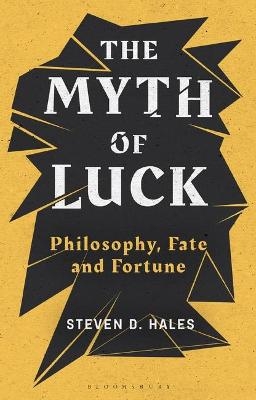
The Myth of Luck
Bloomsbury Academic (Verlag)
978-1-350-14929-8 (ISBN)
Taking us on a guided tour of one of our oldest concepts, we begin in ancient Greece and Rome, considering how Plato, Plutarch, and the Stoics understood luck, before entering the theoretical world of probability and exploring how luck relates to theology, sports, ethics, gambling, knowledge, and present-day psychology. As we travel across traditions, times and cultures, we come to realize that it’s not that as soon as we solve one philosophical problem with luck that two more appear, like heads on a hydra, but rather that the monster is altogether mythological. We cannot master luck because there is nothing to defeat: luck is no more than a persistent and troubling illusion.
By introducing us to compelling arguments and convincing reasons that explain why there is no such thing as luck, we finally see why in a very real sense we make our own luck, that luck is our own doing. The Myth of Luck helps us to regain our own agency in the world - telling the entertaining story of the philosophy and history of luck along the way.
Steven D. Hales, Ph.D. (Brown) is Professor and Chair of Philosophy at Bloomsburg University of Pennsylvania, USA. He works primarily in metaphysics and epistemology, and also in popular philosophy. He has been a Visiting Professor at the Universities of Cambridge, Turin, Edinburgh, and London. He is an award-winning writer and teacher, and has published numerous books and articles. Find him at stevenhales.org.
Acknowledgements
1. Lachesis's Lottery and the History of Luck
The Myth of Er
Tuche and Fortuna
Submission to luck: lucky charms
Rebellion against luck: Stoicism
Denial of luck: all is fated
Luck and gambling
2.Luck and Skill
Slaying Laplace's Demon
A probability theory of luck
Winners and losers
Buying hope on credit
A skill equation?
Problems with probability
3. Fragility and Control
Invisible cities of the possible
The garden of (logically) forking paths
A modal theory of luck
Transworld 2000
Lucky necessities
A control theory of luck
Séances and rubber hands
Wimbledon 2012
Synchronic and diachronic luck
4. Moral Luck
The Kantian puzzle
The Egg of Columbus
The accidental Nazi and the museum of medical oddities
Equalizing fortune
Privilege
Essential origins
5. Knowledge and Serendipity
Finding Meno
Discover « forget
The man who sold the Eiffel Tower and other skeptical threats
The Overton Window
Serendipity
Divide and conquer
6. The Irrational Biases of Luck
The frame shop
Dueling vignettes
Optimism vs. pessimism
Sailing stones and flying witches
Machine gambling
Against luck
Go luck yourself
Notes
Bibliography
Index
| Erscheinungsdatum | 21.08.2020 |
|---|---|
| Verlagsort | London |
| Sprache | englisch |
| Maße | 138 x 216 mm |
| Gewicht | 306 g |
| Themenwelt | Geisteswissenschaften ► Philosophie ► Erkenntnistheorie / Wissenschaftstheorie |
| Geisteswissenschaften ► Philosophie ► Geschichte der Philosophie | |
| Geisteswissenschaften ► Philosophie ► Philosophie der Neuzeit | |
| Geisteswissenschaften ► Psychologie | |
| ISBN-10 | 1-350-14929-2 / 1350149292 |
| ISBN-13 | 978-1-350-14929-8 / 9781350149298 |
| Zustand | Neuware |
| Haben Sie eine Frage zum Produkt? |
aus dem Bereich


![Was heißt Denken?. Vorlesung Wintersemester 1951/52. [Was bedeutet das alles?] - Martin Heidegger](/media/113619842)